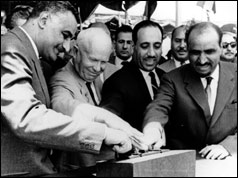Egypt in Middle of Arab Cold War
Cairo is overhauling its foreign policy. America will have to make new tradeoffs to stay in the game.
 Revolutions have consequences, but not always where you might expect. For now, Egypt is not a democracy. The country is governed not by revolutionaries but by a military that was the backbone of the old regime. The most significant changes are to be found elsewhere—in Egypt’s surprisingly sharp shifts on foreign affairs. Just ten weeks after President Hosni Mubarak stepped down, Egypt’s new leaders have made a number of bold moves. Taken together, they suggest a policy re-orientation with important implications for the U.S. and the broader region.
Revolutions have consequences, but not always where you might expect. For now, Egypt is not a democracy. The country is governed not by revolutionaries but by a military that was the backbone of the old regime. The most significant changes are to be found elsewhere—in Egypt’s surprisingly sharp shifts on foreign affairs. Just ten weeks after President Hosni Mubarak stepped down, Egypt’s new leaders have made a number of bold moves. Taken together, they suggest a policy re-orientation with important implications for the U.S. and the broader region.
It was no accident that the first head of state to visit revolutionary Egypt was the president of Turkey, a country that has provided the blueprint for independent foreign-policy making. In rapid succession, Egypt announced it would open a “new page” in its ties with Iran, review its gas deals with Israel, and welcome contacts with Hezbollah to boot. In another first, the Supreme Military Council hosted an official Hamas delegation in Cairo. Meanwhile, the new foreign minister, Nabil al-Araby, has been talking tough, saying that Israel will no longer get “special treatment” and that Egypt must “hold Israel accountable when it does not respect its obligations.”
In idealizing the Egyptian revolution, analysts convinced themselves that the protests were not about America, Israel, or foreign policy, but about democracy and dignity. This may be true, but the line between domestic and foreign policy can often be quite blurry—gone underreported was the fact that many anti-Mubarak chants accused him of being, among other things, an Israeli agent and a Hebrew speaker. Mubarak was illegitimate in the eyes of his people not just because he was a repressive dictator but because he was a repressive dictator who was seen as too close to the U.S. and Israel.
The bargain was always clear: Mubarak would dutifully support U.S. regional objectives, and in return he would get a pass on democracy. Western policy makers feared that more democracy would bring to power governments less amenable to American interests. On this, they were right. Mubarak was just about as anti-Iran as an Arab leader could get. That, though, is now a thing of the past. Democracies are supposed to reflect public preferences, and popular sentiment in Egypt happens to be firmly opposed to current U.S. policy in the region.
Domestic and foreign policy are related in another way. As Egypt’s leaders struggle to deliver on economic and political reform, the temptation to grandstand on foreign policy only grows. International relations scholars call this the “diversionary theory of international conflict”—the notion that foreign conflict is initiated to divert attention from mounting problems at home. Young democracies, newly confident and eager to distance themselves from their predecessors, are particularly susceptible.
But as much as Egypt wishes to chart a new course on foreign policy, it is still bound by old constraints. Egypt remains vulnerable during a difficult phase of transition. It can afford to irritate its Western allies—but within limits. The U.S. and the European Union, as Egypt’s most important donors, will play a critical role in supporting the country’s economic and political revitalization. One obvious red line is the peace treaty with Israel.
Fortunately, for Egyptian policy makers, a successful model is already in place: both Turkey and Qatar manage to be U.S. allies while, at the same time, maintaining friendly relations with the other side in the Arab Cold War. Somehow, for instance, Qatar has figured out a way to both host the world’s largest pre-positioning U.S. military base and hold joint training exercises with Iranian frontier guards. And somehow, it’s worked—pushing the tiny gas-rich emirate into the ranks of the region’s most influential nations.
Meanwhile, Egypt’s influence under Mubarak went into steep decline— a major source of embarrassment for a proud people long used to being the cultural and political heart of the region. For Egyptians, then, the linkage was always self-evident: dignity at home and dignity abroad were two sides of the same coin—and the same revolution. Mubarak had deprived them of both. The chant heard throughout Tahrir Square the night that Mubarak stepped down captured the intertwined motivations: “You’re Egyptian, raise your head up high.”
The question, then, is whether the U.S. is willing (or able) to accept a region where Egyptians and Arabs are not only more democratic, but more independent and assertive as well. Five decades of consistent U.S. support for autocracy were supposed to have rendered such a question moot. Just as it was before, foreign policy is still about tradeoffs. And the key, for policy makers, is knowing which ones to make and when.
Now that Egypt is democratizing, the question of how to reconcile ideals and interests is one it too will have to face. It will need to grapple with when to urge Syria not to shoot its own citizens and when to prioritize the “principle” of non-intervention in its neighbors’ internal affairs—and of when and how to support Palestinian rights and when to stay silent. With parliamentary and presidential elections approaching this fall, the rhetoric will inevitably heat up with candidates denouncing America and declaring their loyalty to the Palestinian cause. This may worry American observers. And perhaps it should. At least in the short run, values and interests do not always converge. Sometimes you have to choose.
